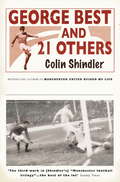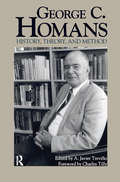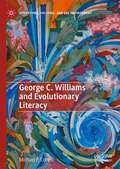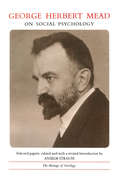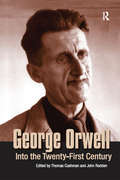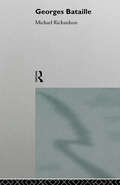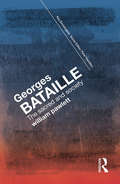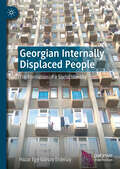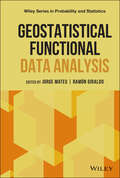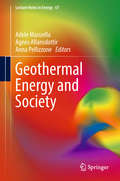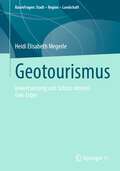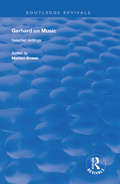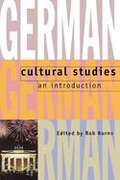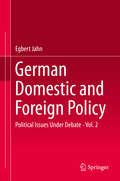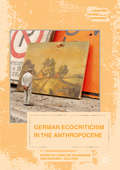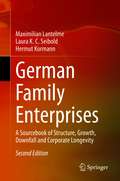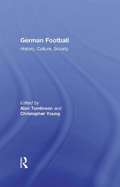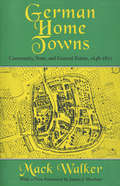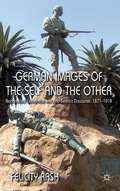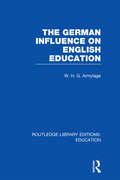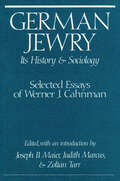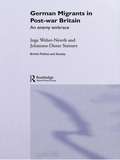- Table View
- List View
George Best and 21 Others
by Colin ShindlerIn the spring of 1964 more than 50,000 people turned out to watch the two-legged semi-final of the FA Youth Cup between Manchester City and Manchester United. It was a time of great hope and excitement: a new era was to be ushered in, with the virtues of youth personified in the Beatles and Harold Wilson - and in the teams that played. But what happened next? For some, like George Best, it was the start of a golden era of success; but for others it was the highlight of a career that never happened. In Shindler's compelling third book of his Manchester trilogy, he captures an era of high expectation, talking to many who played in or watched these famous games; but he also movingly portrays what went wrong for others.
George C. Homans: History, Theory, and Method
by Charles Tilly A Javier TreviqoGeorge C. Homans: History, Theory, and Method offers original essays written by scholars from the fields of sociology, history, anthropology, and literature with the aim of assessing Homans's rich and diverse intellectual contributions. It is the first volume in over thirty years to offer a reappraisal of the life and work of one of the twentieth century's leading social scientists.
George C. Williams and Evolutionary Literacy (Literatures, Cultures, and the Environment)
by Michael P. CohenIn this book, a case study of a humanistic reading of an essential evolutionary theorist, George C. Williams (May 12, 1926–September 8, 2010), the author contends that certain classic works of evolutionary theory and history are the most important nature writing of recent times. What it means to be scientifically literate—is essential for humanistic scholars, who must ground themselves with literary reading of scientific texts. As the most influential American evolutionary theorist of the second half of the twentieth century, Williams masters critique, frames questions about adaptation and natural selection, and answers in a plain, aphoristic writing style. Williams aims for parsimony—to “recognize adaptation at the level necessitated by the facts and no higher”—through a minimalist writing style. This voice articulates a powerful process that operates at very low levels by blind and selfish chance at the expense of its designed products, using purely trial and error.
George Herbert Mead on Social Psychology (The Heritage Sociology)
by George HerbertOne of the most brilliantly original of American pragmatists, George Herbert Mead published surprisingly few major papers and not a single book during his lifetime. Yet his influence on American sociology and social psychology since World War II has been exceedingly strong. This volume is a revised and enlarged edition of the book formerly published under the title The Social Psychology of George Herbert Mead. It contains selections from Mead's posthumous books: Mind, Self, and Society; Movements of Thought in the Nineteenth Century; The Philosophy of the Act; and The Philosophy of the Present, together with an incisive, newly revised, introductory essay by Anselm Strauss on the importance of Mead for contemporary social psychology. "Required reading for the social scientist."—Milton L. Barron, Nation
George Orwell: Into the Twenty-first Century
by John Rodden Thomas CushmanThe year 2003 was the 100th anniversary of the birth of George Orwell, one of the most influential authors of the twentieth century. Orwell's books are assigned today in over 60,000 classrooms annually. In this book essays by prominent writers and scholars explain why his impact continues in a world much changed from his own. The essays explore new aspects of Orwell's life and work and his continuing relevance for the interpretation of modern social, political, and cultural affairs. Thematic topics include: the use and abuse of 1984; ideas, ideologues, and intellectuals; biography and autobiography; literary and stylistic analyses; and the reception of Orwell's work abroad. The volume is an ideal secondary source for those who continue to be influenced by Orwell's insights and for teachers of Orwell's work. Contributors: Christopher Hitchens, Jonathan Rose, Ian Williams, Morris Dickstein, John Rodden, Thomas Cushman, Ronald F. Thiemann, Lawrence Rosenwald, Todd Gitlin, Erika Gottlieb, Dennis Wrong, Daphne Patai, Jim Sleeper, William Cain, Lynette Hunter, Margery Sabin, Vladimir Shalpentokh, Miquel Berga, Gilbert Bonifas, Robert Conquest.
Georges Bataille: An Intellectual Biography
by Michael Richardson Dr Michael RichardsonGeorge Bataille (1867-1962) is widely recognized as one of the most important thinkers of the twentieth century. This is the first book in English to examine Bataille's work as a whole. It offers an accessible introduction to a complex and often ambiguous thinker.
Georges Bataille: The Sacred and Society (Key Sociologists)
by William PawlettIn this comprehensive and engaging study Georges Bataille’s central ideas – the sacred, community and eroticism – are explored in detail. Bataille’s project to understand social bonds and energies at their most fundamental level and to re-energise society by challenging individualism is argued to be of continuing relevance to sociological thought. Bataille’s infamous Collège de Sociologie is placed in the intellectual context of Durkheimian and Maussian sociology. Social effervescence, gift exchange, and the dual, ambivalent and volatile nature of the sacred emerge as the central threads of Bataille’s thought, ideas which challenge both capitalist hegemony and the reductive notion of society as exclusively normative and repressive. The study concludes by applying Bataille’s ideas to contemporary issues including de-secularisation and the rise of religious fundamentalism, the vicarious experience of transgressive violence, and finally, to consumerism and the violence of globalisation. The study seeks to reposition Bataille as a key figure in sociological theory.
Georgian Internally Displaced People: The Formation of a Social Identity
by Hazar Ege Gürsoy ErdenayThis book explores the construction of Internally Displaced Persons (IDPs) identity as a social group in Georgia, framed through Tajfel and Turner's Social Identity Theory. It examines the key factors shaping the identity of Georgian IDPs displaced by ethnic conflicts in two major migration waves (the early 1990s and 2008) from Abkhazia and South Ossetia. Divided into two parts, the study first looks at the historical context of the ethnic conflicts and the state's responses to displacement. The second part focuses on the formation of IDP identity, analyzing how external definitions by the host community have perpetuated devaluation? throughout the post-Soviet period. It also highlights the self-perceptions, characteristics and tactics that have helped transform IDP identity from a devalued label to a more positive and resilient social identity.
Geostatistical Functional Data Analysis (Wiley Series in Probability and Statistics)
by Jorge Mateu Ramón GiraldoGeostatistical Functional Data Analysis Explore the intersection between geostatistics and functional data analysis with this insightful new reference Geostatistical Functional Data Analysis presents a unified approach to modelling functional data when spatial and spatio-temporal correlations are present. The Editors link together the wide research areas of geostatistics and functional data analysis to provide the reader with a new area called geostatistical functional data analysis that will bring new insights and new open questions to researchers coming from both scientific fields. This book provides a complete and up-to-date account to deal with functional data that is spatially correlated, but also includes the most innovative developments in different open avenues in this field. Containing contributions from leading experts in the field, this practical guide provides readers with the necessary tools to employ and adapt classic statistical techniques to handle spatial regression. The book also includes: A thorough introduction to the spatial kriging methodology when working with functions A detailed exposition of more classical statistical techniques adapted to the functional case and extended to handle spatial correlations Practical discussions of ANOVA, regression, and clustering methods to explore spatial correlation in a collection of curves sampled in a region In-depth explorations of the similarities and differences between spatio-temporal data analysis and functional data analysis Aimed at mathematicians, statisticians, postgraduate students, and researchers involved in the analysis of functional and spatial data, Geostatistical Functional Data Analysis will also prove to be a powerful addition to the libraries of geoscientists, environmental scientists, and economists seeking insightful new knowledge and questions at the interface of geostatistics and functional data analysis.
Geothermal Energy and Society (Lecture Notes in Energy #67)
by Adele Manzella Agnes Allansdottir Anna PellizzoneThis book addresses the societal aspects of harnessing geothermal resources for different uses, such as power production, heating and cooling. It introduces a theoretical framework for a social scientific approach to the field, and presents a preliminary collection of empirical case studies on geothermal energy and society from across the world. By providing a conceptual and methodological framework to the study of geothermal energy and societies, it brings together information and analyses in the field that to date have been sparse and fragmented.The contributors explore the diverse aspects of the relationship between the harnessing of geothermal resources and the societies and local communities in which these developments take place. After introducing geothermal technologies, renewable energy concepts as well as their social and policy context and the regulative and environmental aspects of geothermal energy, the book analyzes and discusses twelve global case studies, and compares the social engagement tools applied with those used in other sectors. Of interest to researchers from a range of disciplines who wish to explore the issues surrounding energy and society, it is also a valuable resource for geothermal experts and postgraduate students wish to study the field in greater detail.
Geotourismus: Inwertsetzung und Schutz unseres Geo-Erbes (RaumFragen: Stadt – Region – Landschaft)
by Heidi Elisabeth MegerleGeotourismus, lange als eine Form des Nischentourismus betrachtet, hat sich zu einer nachgefragten Form des Thementourismus entwickelt. Im letzten Jahrzehnt erwies sich Geotourismus sogar als das am schnellsten wachsende Tourismussegment. Geoparks sind die wesentlichen Träger des Geotourismus. Sie sind keine zusätzliche Naturschutzkategorie, sondern eine Prädikatisierung für Gebiete, die ein herausragendes Geopotential aufweisen sowie eine Strategie zur nachhaltigen Regionalentwicklung. Ihre spezifischen Geotope und Geolandschaften (Geodiversität) nutzen sie für ein geotouristisches Standortmarketing. Über Geobildung wird Interesse für geotouristische Angebote geweckt und ein Bewusstsein für den Geotopschutz aufgebaut, der nach wie vor ein Stiefkind des Naturschutzes ist. Bereits seit dem Jahr 2000 besteht das Netzwerk der European Geoparks. In Deutschland können zusätzlich Nationale GeoParks anerkannt werden. 2015 wurde mit den UNESCO Global Geoparks eine weitere Kategorie von UNESCO Stätten – neben den Welterbestätten und den Biosphärenreservaten – ins Leben gerufen. Als Modellregionen für nachhaltige Entwicklung sollen sie aufzeigen, wie Ziele der globalen Nachhaltigkeitsagenda 2030 auf kommunaler und regionaler Ebene umgesetzt werden können.
Gerhard on Music: Selected Writings
by Meirion Bowen Roberto GerhardThis title was first published in 2000: Catalan-born composer Roberto Gerhard (1896-1970) left significant legacies - both musical and documentary. Exiled in Cambridge with the onset of the Spanish Civil War, he gradually achieved wide recognition by performers and conductors, in both Britain and America, as a composer whose music was essential to the modern repertoire. In this work, the author collects many of the composer's articles, reviews, lectures and broadcasts to demonstrate the full extent and continuity of Gerhard's artistic and creative thinking. The writings have been arranged thematically to emphasize the evolution of Gerhard's musical interests. His attachment to Spanish and Catalonian traditions broadened into a fascination with folk music of all kinds. His studies with Schoenberg in the mid 1920s gave him the key to his own creative individuality; thereafter, his imaginative vitality led him eventually to experiment with electronic and concrete music and he continued breaking new ground, even in his final years.
German Cosmopolitan Social Thought and the Idea of the West
by Austin HarringtonThere has been considerable interest in recent years in German social thinkers of the Weimar era. Generally, this has focused on reactionary and nationalist figures such as Schmitt and Heidegger. In this book, Austin Harrington offers a broader account of the German intellectual legacy of the period. He explores the ideas of a circle of left-liberal cosmopolitan thinkers (Troeltsch, Scheler, Tönnies, Max Weber, Alfred Weber, Mannheim, Jaspers, Curtius, and Simmel) who responded to Germany's crisis by rejecting the popular appeal of nationalism. Instead, they promoted pan-European reconciliation based on notions of a shared European heritage between East and West. Harrington examines their concepts of nationhood, religion, and 'civilization' in the context of their time and in their bearing on subsequent debates about European identity and the place of the modern West in global social change. The result is a groundbreaking contribution to current questions in social, cultural and historical theory.
German Cultural Studies: An Introduction
by Rob BurnsMajor changes have been taking place in the context of German Studies in both secondary and higher education, with the focus shifting to a broader range of cultural forms. Based on the view that cultures are the products of class, place, gender, and race,German Cultural Studiestakes account of these changes and adopts an interdisciplinary approach in its wide-ranging study of German culture and society since 1871. Emphasizing recent and contemporary developments, the book features chronological sections on Imperial Germany, the Weimar Republic, the Third Reich, the German Democratic Republic, and the Federal Republic. The contributors chart the growth of modernization and the culture industry in Germany, and examine the extent to which culture in any given period functions as an instrument of ideological manipulation or critical enlightenment. Throughout, the emphasis is on the interactions of culture, society and ideology, and the role of culture in both public and private consciousnesses. Copiously illustrated, and with a comprehensive bibliography, the volume will be essential reading for anyone interested in modern and contemporary German society and its culture.
German Domestic and Foreign Policy
by Egbert JahnThis volume analyses current German domestic and foreign policy debates of international relevance. By reflecting their contemporary historical background and discussing the logic behind the different positions in a dispute, the author considers issues such as whether Muslim women should be allowed to wear headscarves, fears about immigration, the predominance of either a single national culture or multicultural pluralism and the admissibility of multiple citizenship. This book also sheds new light on the debate over the boundaries of freedom of expression, which was triggered by the so-called Danish "Mohammad cartoons. " Aspects of German foreign policy are addressed, including the debate on the ratification of a European constitutional treaty and of the Treaty of Lisbon, German attempts to obtain a permanent seat on the Security Council, as well as the question of whether the deployment of the German army in Afghanistan contributed to the defense of Germany. This book is of interest to students and scholars of political sciences, as well as to journalists and practitioners interested in an analysis of current political debates in Germany.
German Ecocriticism in the Anthropocene
by Caroline Schaumann Heather I. SullivanThis book offers essays on both canonical and non-canonical German-language texts and films, advancing ecocritical models for German Studies, and introducing environmental issues in German literature and film to a broader audience. This volume contextualizes the broad-ranging topics and authors in terms of the Anthropocene, beginning with Goethe and the Romantics and extending into twenty-first-century literature and film. Addressing the growing need for environmental awareness in an international humanities curriculum, this book complements ecocritical analyses emerging from North American and British studies with a specifically German Studies perspective, opening the door to a transnational understanding of how the environment plays an integral role in cultural, political, and economic issues.
German Family Enterprises: A Sourcebook of Structure, Growth, Downfall and Corporate Longevity
by Hermut Kormann Maximilian Lantelme Laura K. SeiboldThe second edition of this professional guide presents an extended overview of the German family enterprise landscape including its structure and industry distribution. Its goal is to provide a detailed assessment of the development of German family enterprises. Based on several new scientific studies conducted by the authors, the prerequisits of corporate longevity and mature growth are investigated in detail. Analyzing data from over 500 family firms, the book offers a valuable reference guide for market research and academic research on family-owned enterprises. A unique factor: the authors’ revealing insights into the decline of family firms.
German Football: History, Culture, Society
by Christopher Young Alan TomlinsonThis topical book provides unprecedented analysis of football's place in post-war and post-reunification Germany. The expert team of German and British contributors offers wide-ranging perspectives on the significance of football in German sporting and cultural life, showing how it has emerged as a focus for an expression of German national identity and pride in the post-war era. Some of the themes examined include: footballing expressions of local, regional and national identity ethnic dynamics, migrant populations and Europeanization German football’s commercial economy women’s football. Key moments in the history of German football are also explored, such as the victories in 1954, 1972 and 1990, the founding of the Bundesliga, and the winning bid for the 2006 World Cup.
German Home Towns: Community, State, and General Estate, 1648–1871
by Mack Walker James J. SheehanGerman Home Towns is a social biography of the hometown Bürger from the end of the seventeenth to the beginning of the twentieth centuries. After his opening chapters on the political, social, and economic basis of town life, Mack Walker traces a painful process of decline that, while occasionally slowed or diverted, leads inexorably toward death and, in the twentieth century, transfiguration. Along the way, he addresses such topics as local government, corporate economies, and communal society. Equally important, he illuminates familiar aspects of German history in compelling ways, including the workings of the Holy Roman Empire, the Napoleonic reforms, and the revolution of 1848. Finally, Walker examines German liberalism's underlying problem, which was to define a meaning of freedom that would make sense to both the "movers and doers" at the center and the citizens of the home towns. In the book's final chapter, Walker traces the historical extinction of the towns and their transformation into ideology. From the memory of the towns, he argues, comes Germans' "ubiquitous yearning for organic wholeness," which was to have its most sinister expression in National Socialism's false promise of a racial community. A path-breaking work of scholarship when it was first published in 1971, German Home Towns remains an influential and engaging account of German history, filled with interesting ideas and striking insights--on cameralism, the baroque, Biedermeier culture, legal history and much more. In addition to the inner workings of community life, this book includes discussions of political theorists like Justi and Hegel, historians like Savigny and Eichhorn, philologists like Grimm. Walker is also alert to powerful long-term trends--the rise of bureaucratic states, the impact of population growth, the expansion of markets--and no less sensitive to the textures of everyday life.
German Images of the Self and the Other
by Felicity RashThis book provides a detailed linguistic analysis of the nationalist discourses of the German Second Reich, which most effectively demonstrate the contrasting images of the German Self and its various Others, such as Jews, native Africans, gypsies and the enemy Other during the First World War.
German Immigrants, Race, and Citizenship in the Civil War Era
by Alison Clark EffordThis study of Civil War-era politics explores how German immigrants influenced the rise and fall of white commitment to African-American rights. Intertwining developments in Europe and North America, Alison Clark Efford describes how the presence of naturalized citizens affected the status of former slaves and identifies 1870 as a crucial turning point. That year, the Franco-Prussian War prompted German immigrants to reevaluate the liberal nationalism underpinning African-American suffrage. Throughout the period, the newcomers' approach to race, ethnicity, gender, and political economy shaped American citizenship law.
German Influence on English Education (Routledge Library Editions: Education)
by W H ArmytageThis book traces the impact of German educationists, such as Froebel and Herbart, on practice in Britain while stressing the important and lasting influence of German scientists, technologists, philosophers, sociologists and historians on our educational system. This record of interplay between the two countries shows not only the influence of German innovations but also the effect on British education of the many German émigrés in the last two hundred years.
German Jewry: Its History and Sociology
by Joseph B. MaierThis history of post-Emancipation German Jewry and of the Holocaust aftermath has received considerable scholarly attention. The study of Jewish life in Germany in the 1930s and the migration impelled by the Nazi period has, on the other hand, been comparatively neglected. The work of Werner J. Cahnman (1902-1980) goes a long way toward filling this gap.Cahnman's examination of "the Jewish people that dwells among the nations" is focused on Germany because it was the country "where in modern times the symbiosis . . . has been most intimate and it also has been the country where the conflict degenerated into the monstrosity of the Holocaust." This representative anthology of his essays shares a common theme, although the examples differ in thought, method and style. Whether he explores the stratification of pre-Emancipation German Jewry, the rise of the Jewish national movement in Austria, or such an esoteric topic as the influence of the kabbalistic tradition on German idealist philosophy; whether he muses on the writing of Jewish history or reports on his firsthand experience in Dachau, Cahnman's work reflects central concerns of his personal and scholarly existence as a German Jew. Because he usually combined extensive empirical data with his own background and personal experience, he is able to craft a penetrating analysis of the recent history of Jewish life in Central Europe. Werner Cahnman believed that the "writing of history is vital for the continued cultural identity of the human kind."
German Migrants in Post-War Britain: An Enemy Embrace (British Politics and Society)
by Dr Inge Weber-Newth Johannes-Dieter SteinertBoth timely and topical, with 2005 marking the 60th anniversary of the end of the Second World War, this unique book examines the little-known and under-researched area of German migration to Britain in the immediate post-war era. Authors Weber-Newth and Steinert analyze the political framework of post-war immigration and immigrant policy, and the complex decision-making processes that led to large-scale labour migration from the continent. They consider: * identity, perception of self and others, stereotypes and prejudice* how migrants dealt with language and intercultural issues* migrants' attitudes towards national socialist and contemporary Germany* migrants' motivation for leaving Germany* migrants' initial experiences and their reception in Britain after the war, as recalled after 50 years in the host country, compared to their original expectations. Based on rich British and German governmental and non-governmental archive sources, contemporary newspaper articles and nearly eighty biographically–oriented interviews with German migrants, this outstanding volume, a must-read for students and scholars in the fields of social history, sociology and migration studies, expertly encompasses political as well as social-historical questions and engages with the social, economic and cultural situation of German immigrants to Britain from a life-historical perspective.
German Migrants in Post-War Britain: An Enemy Embrace (British Politics and Society)
by Dr Inge Weber-Newth Johannes-Dieter SteinertBoth timely and topical, with 2005 marking the 60th anniversary of the end of the Second World War, this unique book examines the little-known and under-researched area of German migration to Britain in the immediate post-war era. Authors Weber-Newth and Steinert analyze the political framework of post-war immigration and immigrant policy, and the complex decision-making processes that led to large-scale labour migration from the continent. They consider:* identity, perception of self and others, stereotypes and prejudice* how migrants dealt with language and intercultural issues* migrants' attitudes towards national socialist and contemporary Germany* migrants' motivation for leaving Germany* migrants' initial experiences and their reception in Britain after the war, as recalled after 50 years in the host country, compared to their original expectations.Based on rich British and German governmental and non-governmental archive sources, contemporary newspaper articles and nearly eighty biographically–oriented interviews with German migrants, this outstanding volume, a must-read for students and scholars in the fields of social history, sociology and migration studies, expertly encompasses political as well as social-historical questions and engages with the social, economic and cultural situation of German immigrants to Britain from a life-historical perspective.
